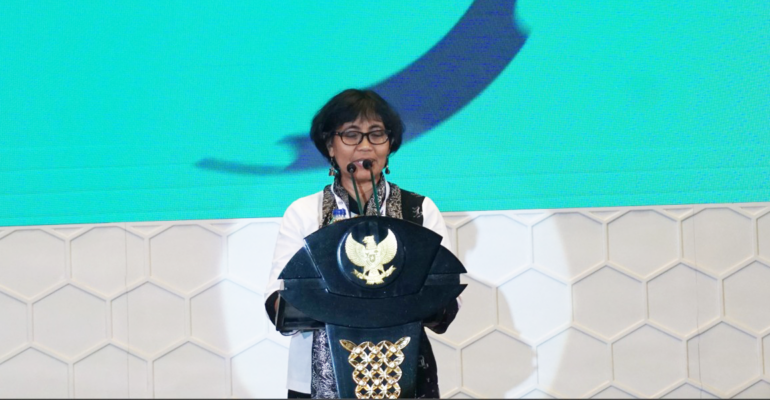IPB University Expert: Culture and Local Wisdom are the Way to Food Self-Sovereignty

Prof Damayanti Buchori, the Chair of the Center for Transdisciplinary and Sustainability Sciences (CTSS) of IPB University, gave a cultural speech at the 2023 Indonesian Cultural Congress, 24/10. She delivered a speech entitled ‘A Reflection on History, Knowledge and Humanity: Voices from Coastal and Small Islands’.
“I invite you to place local wisdom and culture as a way to transform the food system of an archipelagic country, by honouring the values of diversity and sovereignty. From the voices of coastal and small island communities, we can learn to find strategies and road maps so that Indonesia as a nation is able to realise true food sovereignty,” she said.
Furthermore, in the perspective of culture and food sovereignty, Prof Damayanti conveyed the nature of Indonesia as an archipelago. She explained that the food system should be founded on the reality of national diversity.
“Indonesia is the largest archipelago in the world. It has more than 17,000 islands with various social, ecological and cultural characteristics that form the diversity of Indonesia’s food system,” said Prof Damayanti, IPB University lecturer from the Department of Plant Protection, Faculty of Agriculture.
She continued, the birth of agriculture in various places has produced different, distinctive and specific farming “cultures”. The culture then developed into traditional knowledge over the millennia. An example is a flower from Tanah Karo. Locals call it bunga dawa, which is more commonly known as barley. Jewawut was known as a source of carbohydrate before the introduction of rice in the area.
Local cultures related to food include Leuit from Sunda and Langkau from Dayak as granaries for food security. Leuit and Langkau are used by local communities to store agricultural products such as rice, corn and sweet potatoes.
Prof Damayanti also mentioned food sovereignty from small islands in Indonesia. She cited the interesting phenomenon of a group of people in Parahing Kambata Wundut, East Sumba, who experienced a different experience during the locust explosion. This indigenous community still upholds their local wisdom based on the Marapu custom. They have customary institutions for rituals and unique production organisations.
“They have customary institutions for rituals and organisation of production. Marapu values everything that exists in this world as something alive. Therefore, before cultivating, they must communicate with God and their ancestors. There are at least 10 customary rituals that they must do in one cycle of rice cultivation in their fields,” she explained.
Prof Damayanti said the uniformity of production systems, consumption, policies and programmes, as well as indicators of food development currently marginalises the locality dimension and diversity of food systems in Indonesia. This has led to vulnerability, weak resilience, dependence and various crises of damage to local agroecosystems and their carrying capacity.
“The uniformity is strongly influenced by the perspective of policy makers and scientists who ignore the diversity of food systems in Indonesia. We can examine this from several aspects related to our food system,” he said.
He emphasised that food system transformation must start from the mind. The way of looking at food. Prof Damayanti said, don’t humans need macro and micro nutrients to live a healthy and quality life? Therefore, according to her, we need carbohydrate self-sufficiency that can be obtained from a variety of food sources (not only rice), protein self-sufficiency obtained from a variety of protein sources and so on.
“We need to further explore the diversity of our food sources, innovate and look at the practices of our diverse communities in food production, getting out of the commodity economy trap,” she said. (IAAS/RUM)



